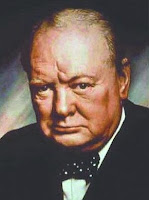 As a former print journalist and a veteran of the Army's 29th Infantry Division (which landed on Omaha Beach on D-Day), I'm amazed that some war correspondents were trusted with the details of the operation prior to the June 6 invasion.
As a former print journalist and a veteran of the Army's 29th Infantry Division (which landed on Omaha Beach on D-Day), I'm amazed that some war correspondents were trusted with the details of the operation prior to the June 6 invasion.In today's dog-eat-dog, 24-hour news cycle, no military commander would ever divulge such sensitive information to journalists. If he did, certainly no reporter would keep quiet about it for very long.
Though the D-Day reporters stayed mum until the invasion began, one World War II journalist encountered a similar situation and made a very different decision.
While serving as a war correspondent, the esteemed New York Times reporter/editor James "Scotty" Reston learned a Nazi submarine had attacked a British warship in the Scapa Flow, causing serious damage to the vessel. Despite operating under strict censorship restrictions, Reston reported the story to his editors using coded language to evade scrutiny, a decision he later regretted.
Case Western Reserve University journalism professor Ted Gup recounted Reston's reaction in his article "Secrecy and the Press in a Time of War."
“I think that was unethical,” Reston reflected. “That was a case where my fastball was better than my control. I’d like to take that one back.”
"Reston’s remorse confirms the conventional wisdom that reporters in times of war often find themselves torn between the instincts of a journalist and the duties of a citizen," Gup writes.
While some argue this brazen action launched Reston's storied career, British Prime Minister Winston Churchill was reportedly furious at the reporter's actions.
As a former member of the Fourth Estate and the military, the struggle is easy for me to understand. It is also the topic of Chapter 4 in "Media Ethics Issues & Cases" "Loyalty: Choosing between Competing Allegiances."
Once he'd learned of the attack on the British cruiser, Reston certainly struggled to balance his loyalty to his "professional practice" (as well as his "loyalty arising from employment") with his "loyalty arising from shared humanity," but in the end, one loyalty triumphed over the other. I'm not surprised that Reston felt divided loyalties. What does surprise me is that he admitted he'd made a mistake in the one he eventually chose to honor.
Reston knew that reporting a submarine attack on a British ship in British waters would give Germany vital intelligence on what physical damage its fleet was causing. It is likely he also knew this information would be a propaganda windfall for Great Britain's enemy and would be used to demoralize the Allied cause and inspire the German public and its military.
The censorship restrictions Reston operated under were certainly strict and, as Gup points out, many war correspondents "were easily discouraged in their fights with the censor and the gold braid and contented themselves with writing pretty stories about generals and admirals and movie heroes who happened to be wearing uniforms. Or they were content to sit around the rear bases and write only what the public relations officer brought around to them."
But as draconian as these restriction may have been, I believe there were valid military reasons for implementing them, a fact Reston surely would have acknowledged. Had I been in Reston's situation, I would have balanced the need to serve my readers with the possible impact my reporting would have on civilian and military populations, both in my country (and the countries of its allies) and the enemy's.
While it might be more difficult to envision what would happen if I didn't report such information, the impact of reporting it would be more easily considered. Clearly, it would provide Germany a military advantage, even if only in the short term, and would have a negative impact on the Allied cause. These facts are nearly impossible to dispute.
As a U.S. citizen (as Reston was), I would have viewed the issue within the context of press freedoms and the conflict itself by asking "If the enemy of my nation, Germany, were to gain advantage from my reporting and eventually emerge victorious, what press freedoms would remain?" While Allied war correspondents labored under restrictions and censorship during World War II, these were temporary measures and ones that would evaporate once the war had ended, but only if the Allies were the victors.



No comments:
Post a Comment